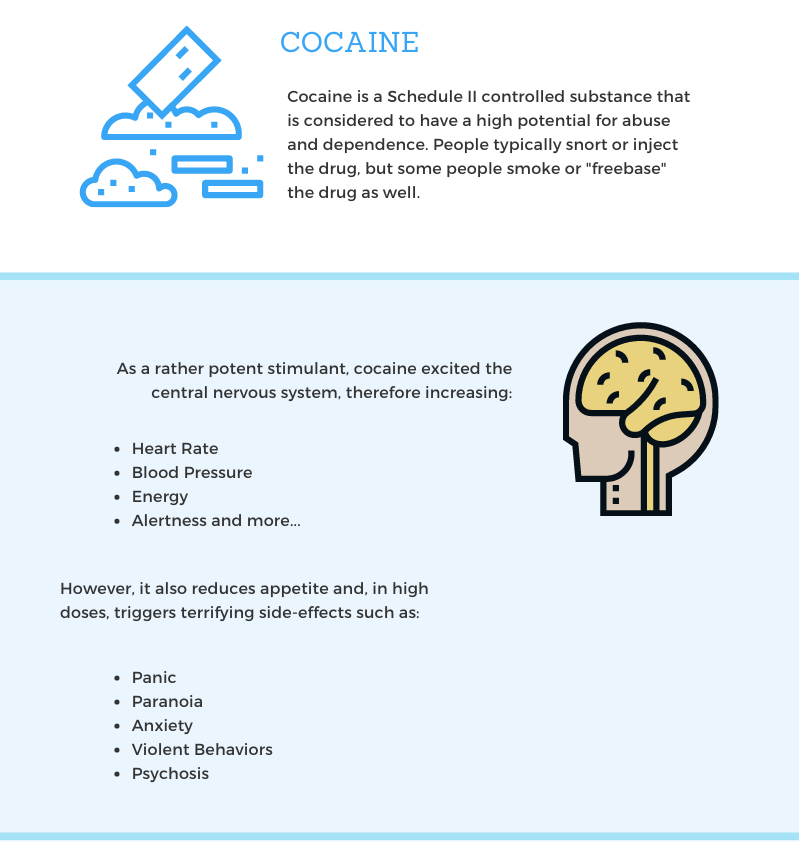Despite the fact that most people recognize cocaine as a highly addictive drug, it is still used by many. It is an illegal white powdery substance that produces excess energy and euphoria. Cocaine is usually snorted, but it can also be smoked or injected. Some slang terms for cocaine include blow, coke, snow, and powder.
When cocaine is abused habitually, it can be habit-forming. Cocaine addiction can be extremely difficult to overcome, as it affects nearly every part of the body. If you are concerned that you or a loved one is addicted to cocaine, here’s everything you need to know about cocaine addiction.

What Happens When You Do Cocaine
Cocaine produces psychoactive and addictive effects on the regions of the brain that regulate motivation and pleasure. When taken, the brain produces dopamine – a neurochemical that causes euphoria and feelings of well-being. Due to the drug’s ability to increase pleasure and euphoria, a person may begin to use the drug habitually.[1]
The short term effects of cocaine include:[2]
- Intense feelings of happiness
- Decreased appetite
- Dilated pupils
- Sensitivity to light, touch, and sound
- Increased energy and alertness
- Anger/irritability
- Paranoid thoughts
- Restlessness
- Abnormal heart rhythms
- Insomnia
- Low blood pressure
The immediate effects of cocaine are short-lived. Sometimes, they last as little as 20-30 minutes. However, when taken in large doses, cocaine is extremely dangerous. In very rare cases, cocaine can cause death due to cardiac arrest or seizures. If cocaine is abused regularly, a person may become addicted and display certain signs and symptoms.
Signs and Symptoms of Cocaine Addiction
The signs and symptoms of cocaine addiction vary from person to person. In addition, the severity of symptoms can vary depending on how long cocaine has been abused, how much is used, and how often cocaine is used. If a person is addicted to cocaine, you may notice the following behavioral, emotional, and physical symptoms.
Behavioral Symptoms:
- Lying about using cocaine
- Failing to meet obligations and responsibilities
- Strained personal relationships
- Legal problems
- Money problems
- High levels of excitement and energy
- Rapid speech
- Increased agitation and hostility
- Engaging in risky behaviors (i.e. unprotected sex, sharing needles, intoxicated driving)
Emotional/Psychological Symptoms:
- Restlessness
- Irritability
- Anxiety
- Depression
- Delusions
- Paranoia
- Hallucinations
- Violent behaviors
- Psychosis
Physical Symptoms:
- Nosebleeds
- Stomach problems
- Loss of smell
- Dilated pupils
- Runny nose
- Hoarse voice
- Difficulty swallowing
If you or a loved one is experiencing any or all of these symptoms, you may have a problem with cocaine. In most cases, the best treatment for cocaine addiction is a comprehensive substance abuse program.
Stimulant Use Disorder
Cocaine addiction is formally classified as a stimulant use disorder. Stimulant use disorder is a diagnosis that is outlined and defined in the Diagnostic and Statistical Manual of Mental Disorders (DSM-5). A stimulant use disorder can be diagnosed if a person has experienced a problematic use of stimulant drugs. In addition, the person must have experienced two or more of the following symptoms within a one-year period.[3]
DSM-5 diagnosis guidelines for stimulant use disorder:
- Taking more stimulants than a person intended to take
- Inability to cut down or control stimulant use
- Intense urges and cravings for stimulants
- Failure to meet obligations at work, home, or school
- Continuing to take stimulants despite negative consequences
- Avoiding important social or work-related activities to get high
- Using stimulants in a dangerous way
- Continuing to take stimulants regardless of negative mental or physical health problems
- Increasing tolerance to stimulants
- Withdrawal from stimulants when not taken
If a person has a stimulant use disorder, he or say may be more susceptible to the long term health effects of cocaine abuse.
Long Term Effects of Cocaine Abuse
Cocaine abuse can have various negative health effects on the body. Not only does cocaine affect the brain, but it affects nearly every major functioning part of the human body. Some long term effects of cocaine abuse include:[2][4]
- Headaches
- Seizures or convulsions
- Heart disease
- Stroke
- Mood swings
- Low sex drive
- Damaged sense of smell
- Reduced cognitive abilities
- Nasal inflammation
- Lung damage
- Increased risk for central nervous system disorders
The best way to prevent and heal from the long-term effects of cocaine use is to abstain completely. While it isn’t easy, an addiction treatment center in Palm Beach can help.
Addiction Treatment for Stimulant Use Disorder
Cocaine addiction can be difficult to overcome alone. After all, after quitting cocaine, the mind and body will need the drug to feel normal. This can make early recovery particularly difficult for people with stimulant use disorders. However, drug rehab in Palm Beach can increase your chances of quitting successfully.
“Our customized approach to partial hospitalization helps you or your loved one continue to break their dependence on drugs and alcohol and address the true underlying causes of their disease – all while considering your unique and specific needs. Our customized treatment plans empower each patient to successfully cope with their individual triggers, allowing them to live their healthiest, most fulfilling lives.”
Substance abuse counseling can help people cope with withdrawal symptoms, mitigate cravings and urges to use, and establish a drug-free life. If you or a loved one is suffering from cocaine addiction, contact our addiction specialists today.
References:
- https://www.ncbi.nlm.nih.gov/pmc/articles/PMC2851032/
- https://www.healthline.com/health/what-happens-if-you-do-coke-once#side-effects-after-initial-use
- https://www.verywellmind.com/stimulant-use-disorder-speed-meth-or-cocaine-addiction-21987











